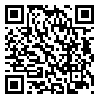BibTeX | RIS | EndNote | Medlars | ProCite | Reference Manager | RefWorks
Send citation to:
URL: http://ncmbjpiau.ir/article-1-809-en.html
Aim and Background: Hypericin is a photosensitive Naphthodianthrones with photodynamic activities. In recent years, the pharmacology studies have shown that extracts and compounds obtained from Hypericum perforatum have some properties such as: antidepressants, anti-cancer, anti-antioxidant, anti-bacterial and anti-microbial and recently, there is great attention to this herb due to its effect for treatment of AIDS. In this work, the chemical stimuli effects of methyl-jasmonate and salicylic acid in medium stage (MS) on Hypericin production stimulation during a 42-day period was examined.
Material and Methods: Stem and leaf explants were isolated from planted sterile seedlings in medium and were transferred to MS condition including methyl-jasmonate stimulus with concentration of (0, 50, 100, 150, 250 and 500 µicro-Molar) and salicylic acid stimuli with concentration of (0, 50, 100, 150, 200 and 400 µicro-Molar) and then were kept in temperature about 21 ± 3 °C in 16 hours lighting and 8 hours dark light condition. The methanol extracts of this plant were analyzed with HLPC apparatus for studying the changes in Hypericin amount.
Conclusion: The results showed that the concentration of 100µM methyl-jasmonate produces more Hypericin (%34, 66) than other producers. Also these results showed that salicylic acid stimuli have no tangible effect on Hypericin production and using concentrations more than 100µM of salicylic acid causes destruction of plant tissue cultures of Hypericum perforatum.
Results: The chemical stimulus, methyl -jasmonate is more effective in Hypericum production of plant Hypericin tissue culture. The chemical irritant effect of salicylic acid did not significantly increase the amount Hypericin in the plant Hypericum.
Received: 2016/06/6 | Accepted: 2016/06/6 | Published: 2016/06/6
| Rights and permissions | |
 |
This work is licensed under a Creative Commons Attribution-NonCommercial 4.0 International License. |





